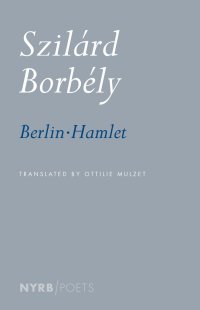August 7, 2017—The American Literary Translators Association (ALTA) is pleased to announce the shortlists for the 2017 National Translation Awards (NTA) in Poetry and Prose! This is the nineteenth year for the NTA, which is administered by the ALTA, and only the third year to award separate prizes in poetry and prose. The NTA is the only national award for translated fiction, poetry, and literary nonfiction that includes a rigorous examination of both the source text and its relation to the finished English work.
This year’s judges for poetry are Ani Gjika, Katrine Øgaard Jensen, and Gregory Racz. This year’s prose judges are Carol Apollonio, Eric M. B. Becker, and Ottilie Mulzet. Award selection criteria include the quality of the finished English language book, and the quality of the translation.
The winning translators will receive a $2,500 cash prize each, and the awards will be announced at ALTA’s annual conference, held this year at the Radisson Blu Minneapolis Downtown in Minneapolis, MN from October 5-8, 2017. Follow our blog (www.literarytranslators.org/blog), Twitter (@LitTranslate), or Facebook (www.facebook.com/literarytranslators) for the announcement of the winners!
The 2017 NTA Shortlist in Poetry (in alphabetical order by title):
 Berlin • Hamlet
Berlin • Hamlet
by Szilárd Borbély
translated from the Hungarian by Ottilie Mulzet
(New York Review of Books)
Berlin • Hamlet, Szilárd Borbély’s first full poetry collection published in English is a “labyrinth of voices” with references and allusions to Franz Kafka, Walter Benjamin, and Hungarian poets Attila József and Erno Szép and a testament to an artist’s noble task who turns tragedy into art. Borbély’s poetry transcends personal narrative daring to tear open much of what he “would have preserved whole” because “in the light of reality… presence is irrefutable.” He writes with clarity and unembellished language poems that have the power to transport the reader “above the precipice of the everyday.” Ottilie Mulzet’s translations render Borbély’s voice and grief palpable and the striking beauty of his poems real.
 Canto General
Canto General
by Pablo Neruda
translated from the Spanish by Mariela Griffor
(Tupelo Press)
Years in the making, Pablo Neruda’s massive and enduring Canto General is a veritable modern epic of Latin America, an imaginative, fifteen-part cultural journey through the centuries-long histories and (post-)colonial challenges of the region. The unique poetic artistry of this foundational work by the Chilean Nobel laureate in literature, which includes the much heralded The Heights of Macchu Picchu, finds a sure English-language voice in Mariela Griffor’s impressive and re-translation. Griffor’s handling of Neruda’s stylized imaging lends this communal celebration of pan-American identity—packed with flora, fauna, battles, conquistadors, and political meditations—the steadying, colloquial diction noticeably wanting in many earlier renderings of Neruda’s work.
 The End of the Dark Era
The End of the Dark Era
by Tseveendorjin Oidov
translated from the Mongolian by Simon Wickhamsmith
(Phoneme Media)
The first book of Mongolian poetry to be published in the United States and a PEN/Heim Translation Fund Winner, The End of the Dark Era is one of few avant-garde collections to have come out of Mongolia. Seemingly focused on his creative vision rather than the fashions of politics or style, Tseveendorjin Oidov—who is also one of Mongolia’s most renowned painters—moves effortlessly between his artistic disciplines, writing dreamscapes as vivid as technicolor while drawing his accompanying images with the pen of a poet astrologer. Translator Simon Wickhamsmith’s minimalist approach to the poems in The End of the Dark Era complements the precise aesthetic of Oidov and leaves the reader with a sense of having just traveled to a fascinating fourth dimension.
 tasks
tasks
by Víctor Rodríguez Núñez
translated from the Spanish by Katherine Hedeen
(co•im•press)
How does an immigrant return to their native country if they’ve never actually left? Through twenty-one sections that make up the remarkable long poem tasks, Cuban poet Víctor Rodríguez Núñez provides a unique contribution to the experience of otherness in literature. Translator Katherine M. Hedeen expertly navigates Rodríguez Núñez’s move toward a new form he calls “edgeless poetry,” with no limits to sense, no point where an idea or emotion begins or ends. Guided by question marks as the only sentence-splitting punctuation, Hedeen summons new meanings and magical images from the text with every new read of this striking poetry collection.
 Valdivia
Valdivia
by Galo Ghigliotto
translated from the Spanish by Daniel Borzutzky
(co•im•press)
In Valdivia, a haunting fusion of history, dreamscape, and memory, Chilean Galo Ghigliotto’s speaker offers a complex vision of his provincial birth city as the site of famous battles, a devastating 1960 earthquake (with its ensuing floods), and eerie, otherworldly phenomena amid the scenario of domestic violence that plagued his own family. Written as a series of forty-three poems tellingly presented out of sequence, Valdivia serves as a sort of poetic catharsis for these afflictions which, embedded in reality, can scarcely pull clear of the imagination. Daniel Borzutzky vividly renders this melding of fact, fiction, and the vagaries of recollection in a lucid and precise English.
The 2017 NTA Shortlist in Prose (in alphabetical order by title):
 I am Behind You
I am Behind You
by John Ajvide Lindqvist
translated from the Swedish by Marlaine Delargy
(Text Publishing)
Four vacationing families at a campground end up one morning in an alternative universe, under attack by zombies—or is it vampires? One by one, the characters quest beyond the besieged campsite to confront a past trauma and accept their fate. Situational comedy at its best: the middle-aged male dairy farmers learning to accept their long-repressed love for each other; the homicidal 70-year-old sawmill operator and his long-suffering wife; two children – one a demon of some kind; a soccer star and his troubled super-model wife. Crazy original, psychologically insightful, suspenseful and hilarious. The dialogue is in perfect pitch, each sentence a work of art. A perfect example of the translator’s craft.
 No Knives in the Kitchens of This City
No Knives in the Kitchens of This City
by Khaled Khalifa
translated from the Arabic by Leri Price
(American University of Cairo Press)
Set in Aleppo between the 1980s and the early millennium, this novel is a family memoir written from the viewpoint of an adult son. The father has long since left, while the mother and the four grown children struggle to define themselves against various and shifting identities competing for claims over them. The interwoven narrative in the novel shifts from one character to another in an almost dreamlike fashion, almost imperceptibly moving between their inner worlds and external circumstances. The writing is sensitive and full of evocative details, creating a fascinating picture of Aleppine society both in the city and the peripheral villages, hauntingly rendered in Leri Price’s sensitive and deeply eloquent translation.
 The Party Wall
The Party Wall
by Catherine Leroux
translated from the French by Lazer Lederhendler
(Biblioasis)
An ingeniously structured novel linking seemingly unconnected stories in subtle ways: two small girls walk to their local store in Savannah, Georgia; a mother in Canadian Maritimes misses her drifter son in the American deep south; the newly-elected Canadian prime minister and his wife move into their official residence; a brother and sister in California grapple with their troubled relationship with their mother. Each relationship is threatened by a subtle, life-changing secret or twist of fate. It’s all here: doubling, incest, love, loss, and the meaning of family. Gentle sympathy for the human condition does not prevent a clear-headed, cold view of reality. The translation is superb, not a word out of place.
 A Whole Life
A Whole Life
by Robert Seethaler
translated from the German by Charlotte Collins
(Farrar, Straus, and Giroux)
“Harsh” is perhaps the word to best describe the life of the bastard Andreas Egger, from the individual events that compose his life to the unforgiving landscape of the valley where he comes of age and later grows old after losing his wife at a young age and being held as a prisoner-of-war by the Russians during WWII. The world here is a threatening one, full of fatal illnesses, avalanches, and social relations that come difficult to Egger, but the protagonist’s simplicity ought not be mistaken for dimwittedness. Full of indelible images and sparkling prose, Charlotte Collins’s translation is a true feat.
 Zama
Zama
by Antonio di Benedetto
translated from the Spanish by Esther Allen
(New York Review of Books)
How fortunate we are to finally have this classic of twentieth-century Argentine literature in English. Zama, “pacifier of Indians” and a servant of the Spanish crown in eighteenth-century colonial America, aches for a better post in a city where he might send for his wife and their children. As his prospects dim, Zama descends into economic and moral penury, his rapidly deteriorating situation revealing not only his own prejudices but those behind the Spanish government’s changing relationship to its colonies. Esther Allen’s superb translation captures the remarkable atmosphere and existential anguish of di Benedetto’s masterwork.
